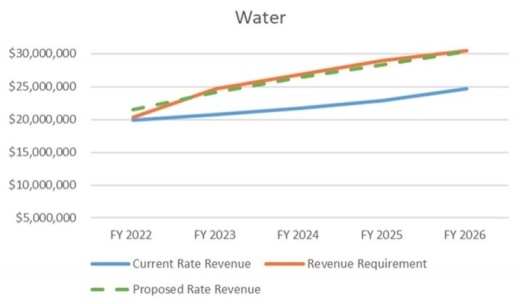A city-commissioned report from NewGen Strategies & Solutions LLC, a consulting firm focused on economic strategies for utility usage, has found that rates for water and wastewater usage projected by the city of Pflugerville over the next five years will not be sufficient.
Based on the city’s projected need, the NewGen report presented to City Council on Aug. 10 suggested slightly increased rates to customers from 2022-26.
Grant Rabon of NewGen strategies told council the city will require overhead including additional staffing based on its growing water needs, but the proposed increases could have been worse.
"We are forecasting that the water rates that would be appropriate ... are in line with what we suggested would be appropriate a year ago," Rabon said, adding the fact that the city has secured favorable loan terms in pursuit of its wastewater facilities that are part of its overall capital improvement plan have helped reduce projected rates.
Factors for the new projected rates include debt service, inflation, the city’s capital improvement plan and water reserves, according to the study.
Based on those and other factors, the NewGen study states the city’s net water revenue requirement will go from about $20.36 million in 2022 to about $30.44 million in 2026.
For wastewater, the city’s net revenue requirement will go from $14.75 million in 2022 to $23.11 million in 2026.
The report states that under the city’s current rate plan, water revenues will fall short of need by $5.72 million for water and $11.73 million for wastewater by 2026.
To get ahead of the projected losses, NewGen stated water rates for usage from 0-3,000 gallons should go from $3.80 per 1,000 gallons this year to $4.80 by 2026, and wastewater rates should go from $4.20 per 1,000 gallons of usage this year to $5.95 by 2026.
In summary, Rabon said an average monthly residential water bill will go from $52.40 currently to $69.40 by 2026. When average monthly residential water and wastewater bills are added together, they would go from $101.90 currently to $130.15 in 2026, he said.
"The bill impact for residential customers is relatively modest," Rabon said, adding that the projections provide an idea of what the future will hold.
Council took no action during presentation of the report.





